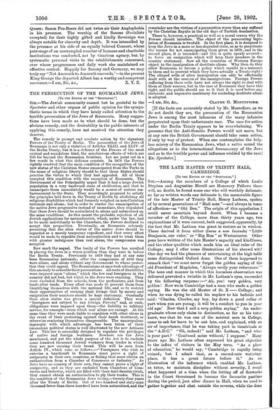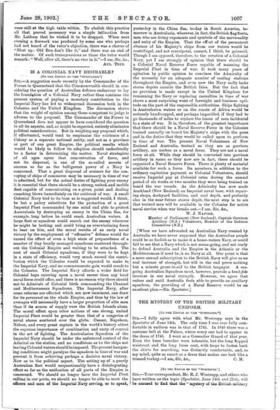THE LATE MASTER OF TRINITY HALL, CAMBRIDGE.
[TO THE EDITOR OF Tim "SPECTATOR."] Srn,—Among the members of a College of which Leslie Stephen and Augustine Birrell are Honorary Fellows there will, no doubt, be found some one who will worthily delineate, so far as written words can delineate it, the memorable figure of the late Master of Trinity Hall, Henry Latham, spoken of by several generations of " Hall men "—and always in tones of affection—as "Old Ben." The origin of this appellation I could never ascertain beyond doubt. When I became a member of the College, more than thirty years ago, two explanations of it were current, both suggested, apparently, by the fact that Mr. Latham was great in stature as in wisdom. These derived it from either (News a non /ucendo)- "Little Benjamin, our ruler," or "Big Ben" at Westminster. Other pens have written of the late Master's sagacity and kindliness, and the other qualities which made him an ideal ruler of the College; may I offer some illustrations of his shrewd wit P One day we had the pleasure of entertaining at the high table some distinguished Oxford dons. One of them happened to remark that " we must never forget the golden saying of the old President of Magdalen, Always verify your references."' The tone and manner in which this harmless observation was delivered provoked a twinkle in Mr. Latham's eyes, succeeded by the following response :—" Ali, yes ! very golden, very golden ! Now we in Cambridge had a man who made a golden saying. He was the old Master of St. X — College ; and when he was dying he called his nephew to his bedside and said: Charles, Charles, my boy, lay down a good cellar of port when you are young; it will be a comfort to you in your old age.' Now that I call a very golden saying." An under- graduate whose only claim to distinction, so far as his tutor knew, was that he was one of the noisiest men in College, came to ask for leave to be out late, and explained, with an air of importance, that he was taking part in theatricals at the " A.D.C." " Oh, indeed! " said Mr. Latham, " and what is your part P Confused noise without,' I suppose." Many years ago Mr. Latham often expressed his great objection to the influx of visitors in the May term. " As a place of education," he would say, " Cambridge is rapidly being ruined; but I admit that, as a second-rate watering- place, it has a great future before it." As an illustration of the influence which enabled Mr. Latham. as tutor, to maintain discipline without severity, .I recall what happened at a time when the letting off of fireworks in the Court threatened to become the favourite pastime during the period, just after dinner in Hall, when we used to gather tcgether, and chat outside the screens, while the dons
were still at the high table within. To abolish, this practice all that proved necessary was a simple intimation from Mr. Latham that he wished it to be dropped. When next evening a firework was produced by some one who perhaps had not heard of the tutor's objection, there was a chorus of "Shut up : Old Ben don't like it," and there was an end of the matter. Of such transgressions as these the tutor would remark : " Well, after all, there's no vice in it."—I am, Sir, &c., AUL. TRIM.



















































 Previous page
Previous page